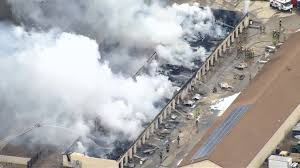Texas is currently grappling with a significant public health issue: an alarming surge in measles cases. In just one month, the number of measles cases in the state skyrocketed from just two to 146, with tragic consequences—one child has died, and 20 others have been hospitalized. Public health experts are worried that the situation could worsen as the outbreak continues to spread, and they are urging the public to take swift action.
The rise in measles cases coincides with a concerning trend: vaccination rates in Texas are declining. Despite the measles vaccine being over 97% effective at preventing the disease, many areas in the state are seeing a drop in the number of children getting vaccinated. In Gaines County, for instance, the vaccination rate was just 82% in 2024, well below the level needed to protect the community. Experts say that the ongoing crisis is a direct result of these low vaccination rates.
Catherine Troisi, an infectious disease expert at UTHealth Houston, explained to CBS Austin that the outbreak was entirely avoidable: “This is entirely due to low vaccination rates. Measles spreads because kids aren’t vaccinated.” She further noted that vaccine hesitancy, which grew during the COVID pandemic, is a major factor behind the current situation.
In response to the rising number of measles cases, Texas health officials have been setting up vaccination clinics to encourage more people to get vaccinated. However, the response from state leaders has been criticized for being slow and inadequate. Notably, Governor Greg Abbott and other key officials have not made public statements about the outbreak, raising concerns about the lack of leadership in addressing the crisis.
While vaccine clinics are a step in the right direction, public health measures like excluding unvaccinated students from schools, which have proven effective in containing outbreaks in other states, have not been implemented in Texas. According to Texas Tribune, such measures require the state health commissioner to declare a public health emergency, which has not yet happened. As a result, unvaccinated students are not being kept out of schools, and the virus continues to spread unchecked.
This lack of action contrasts sharply with how other regions have handled similar outbreaks. For example, during a measles outbreak in Clark County, Washington, in January 2019, the local authorities declared a public health emergency and required unvaccinated students to stay home from school, even if they hadn’t been directly exposed to the virus. The quick response helped to contain the outbreak at 71 cases, with no deaths reported.
Dr. Alan Melnick, the public health director of Clark County at the time, emphasized the importance of acting quickly during such outbreaks, saying, “You gotta jump on this.” His comments highlight the urgency of addressing measles outbreaks, especially when vaccination rates are low and the virus is spreading rapidly.
In Texas, many healthcare professionals are facing the same challenges they encountered during the COVID pandemic—namely, combating widespread misinformation and vaccine skepticism. Dr. Ron Cook, a doctor in Lubbock, explained to CBS Austin that there has been an increase in false information about measles, with some people even hosting “measles parties” or claiming that the government is overreaching by promoting vaccinations.
Since 2018, the number of families seeking vaccine exemptions has nearly doubled in Texas, further complicating efforts to curb the spread of the disease. Dr. Cook and others in the medical community are struggling to convince hesitant parents that vaccinating their children is the best way to protect them from this preventable disease.
Meanwhile, some lawmakers are pushing for bills that would make it easier for parents to opt out of vaccines for their children. These proposed laws would also prevent schools from excluding unvaccinated students during outbreaks, which could potentially make it even harder to contain the spread of the disease. Dr. Peter Hotez, a vaccine expert, expressed his concerns to the Texas Tribune, noting that he doubts the current measles outbreak will prompt meaningful change in state policy. He pointed out that despite the 40,000 Texans who died during the COVID pandemic due to vaccine refusal, there was no significant shift in attitudes toward vaccination.
As the measles outbreak continues to grow, Texas faces a difficult road ahead in addressing the crisis. Public health officials are urging the public to get vaccinated and for state leaders to take more decisive action to contain the spread of the disease. Without a more robust response, there are fears that the outbreak will only get worse, potentially leading to more hospitalizations and, tragically, more deaths.
In the coming weeks, Texas will have to decide whether to implement stricter public health measures, such as excluding unvaccinated students from schools and declaring a public health emergency. Until then, the state’s residents, especially parents, must decide whether they will take the necessary steps to protect their children from this dangerous and highly contagious disease.
Measles, once considered nearly eradicated in many parts of the world, has made a deadly comeback in Texas. With the right measures and a renewed commitment to vaccination, the state can still turn the tide, but it will require swift, coordinated action from both the public and the leaders in charge. The question remains: will they act in time?
Disclaimer – Our team has carefully fact-checked this article to make sure it’s accurate and free from any misinformation. We’re dedicated to keeping our content honest and reliable for our readers.




